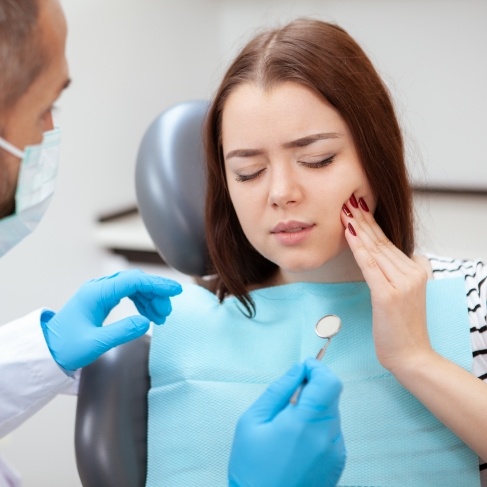Emergency Dentist Louisville
Timely, Personalized Dental Care During Urgent Situations

At Hurstbourne Dental Care, we’re committed to restoring our patients’ oral health and comfort when their teeth become compromised or damaged. That’s why we’re committed to seeing patients in urgent situations within 48 hours of when they call. That way, you won’t have to deal with discomfort for any longer than absolutely necessary. Whether you have a knocked-out, aching, or cracked tooth, don’t hesitate to call our office immediately so we can schedule your appointment for emergency dentistry in Louisville.
Why Choose Hurstbourne Dental Care for Emergency Dentistry?
- Emergency Patients Seen Within 48 Hours
- We Accept Most PPO Dental Insurances
- Experienced & Skilled Dentist & Team
How We Treat Dental Emergencies

- Call Our Office: Always contact our office as early as possible if you have experienced dental trauma or have any out-of-the-ordinary or painful symptoms. Our team will schedule an appointment for you within 48 hours.
- Come In: Once you arrive, our team will get to work collecting diagnostic images, like X-rays, and Dr. Iskander will thoroughly examine your teeth and gums. He’ll also ask you about the symptoms you’re experiencing to gain a better understanding of what issues you may be facing. After this examination is complete, he will provide you with a diagnosis and custom-tailored treatment plan to address the underlying causes of your discomfort.
- Get Treated: Before moving forward with your personalized treatment plan, our team will answer any questions you may have and thoroughly outline what you can expect throughout the process. Then, we’ll get started restoring your smile’s health.
The Most Common Dental Emergencies
At Hurstbourne Dental Care, Dr. Iskander and our amazing team have the skills and knowledge to treat a wide range of dental emergencies, like the ones we most commonly see listed below. If you’re concerned about any unfamiliar dental symptoms you’re experiencing, we invite you to give us a call so we can help!
Understanding the Cost of Dental Emergencies

The treatment required to treat your dental emergency in Louisville will depend on a variety of factors, like Dr. Iskander’s diagnosis and the extent of the damage to your smile. Our team takes pride in offering transparent dentistry, so we’ll provide you with a detailed cost estimate before moving forward with any procedures. That way, you understand exactly what you’re committing to. We accept and maximize PPO dental insurance plans as well, so we can help you save by filing claims on your behalf.
Keys to Preventing Dental Emergencies

While there’s no way to completely avoid experiencing a dental emergency, there are several protective measures you can take, including:
- Brush your teeth twice a day and floss daily.
- Come into our dental office near Jeffersontown for your routine dental checkups and teeth cleanings every six months.
- Bite and chew hard foods carefully.
- Wear a protective mouthguard while playing contact sports.
- Contact us as soon as you feel lingering dental pain
Dental Emergency FAQs
Will My Toothache Go Away on its Own?
Mild tooth pain can come and go, but serious toothaches generally do not fade on their own. These are generally caused by serious infections or damage to the tooth itself, both of which aren’t likely to simply fade over time.
If you find that you’re dealing with serious tooth pain, the best thing to do is to talk to a dentist as soon as possible. We’ll be able to tell you what’s going on with your tooth, why you’re in pain, and take measures to address the issue.
How Should I Sleep with Tooth Pain?
When you talk to us about your dental emergency, we’ll generally try to get you in for a same day appointment. However, people sometimes call us after-hours with their oral health problems, in which case, we won’t be able to help them until the next day. This leaves them in the position of trying to get some sleep while dealing with a toothache.
This is difficult, but there are tricks that can help you. For one, keep your head elevated—this will prevent excess blood flow to the mouth, which can bring down swelling. You can accompany this with over-the-counter pain medicine, taken as directed, and a cold compress to address the most serious swelling.
Can I Fix Dentures that are Broken in Half?
Dentures that have broken completely in half are a serious issue, one that can really only be addressed by a skilled dentist. Even in this situation, repairing your prosthetic isn’t always going to be possible. That being the case, you can’t expect to be able to repair your prosthetic on your own.
The average person doesn’t have the materials or expertise necessary to repair a denture that’s been broken in half. In fact, attempting to do so will likely cause more harm than good. If your prosthetic has been catastrophically damaged, the best thing you can do is talk to a professional immediately.
Can I Drain a Dental Abscess on my Own?
You should never attempt to drain an abscess on your own. Trying to do so can lead to incredibly serious complications; bacteria can spread to other areas in the mouth, and the current infection could even worsen if the procedure is done incorrectly. This is in addition to the important fact that trying to drain your own abscess will be deeply, deeply uncomfortable.
Dental abscesses represent a severe infection that requires immediate attention. It is a dental emergency, and you should talk to a dentist as soon as you possibly can.
